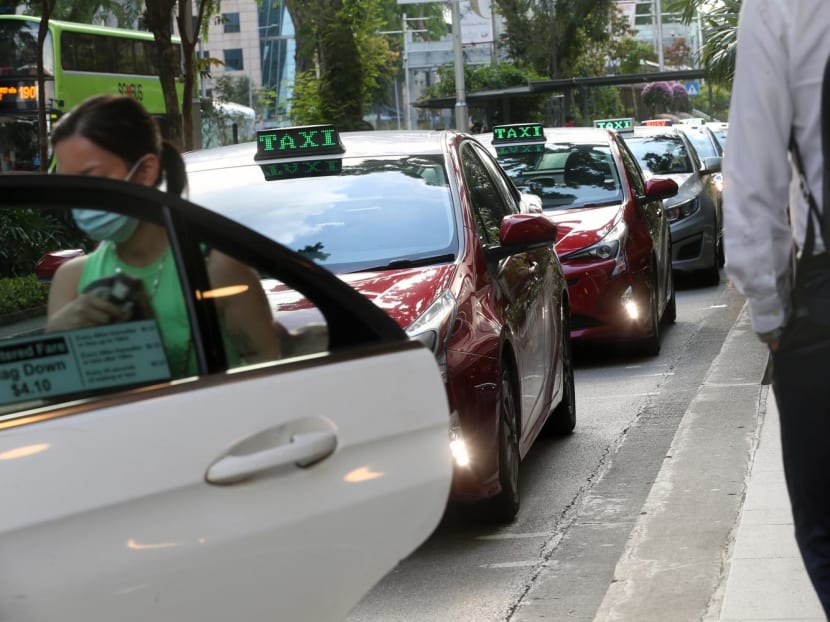Explainer: Should street-hail taxi platforms, logistics companies be included under new measures to protect gig workers' welfare?
SINGAPORE — Although generally supportive of the Government’s move to improve the welfare of gig workers here, several platform companies have expressed concern that the exclusion of street-hail taxi platforms and logistics companies may have an adverse impact on the sector.

- The Government has accepted recommendations by an advisory committee to improve the welfare of gig workers
- These apply to workers who are subject to control by platform companies over the jobs they receive
- Street-hail taxi platforms and third-party logistics companies were excluded due to their difference in business models
- However, platform companies called for the inclusion of such companies to level the playing field
- Experts told TODAY that these companies should be included due to welfare reasons and to avoid economic inefficiency
SINGAPORE — Although generally supportive of the Government’s move to improve the welfare of gig workers here, several platform companies have expressed concern that the exclusion of street-hail taxi platforms and logistics companies may have an adverse impact on the sector.
The Government on Wednesday (Nov 23) accepted all 12 recommendations by an advisory committee on platform workers, which was set up by the Ministry of Manpower last year to propose ways to strengthen protections for these workers here.
Under the new measures, gig workers would be entitled to workplace injury compensation just like regular employees, the right to collectively bargain for wages and benefits as well as CPF contributions.
However, these moves apply only to those who are subject to control by platform companies over the jobs they receive and accept, as well as fees for their services.
This means that street-hailed taxi drivers or delivery workers under third-party logistics companies are exempt from the measures as their business models are different from platform companies.
Professor Danny Quah, vice-chairperson of the committee, said in a press conference on Wednesday: “There is a profound difference between the business model which lets the taxi driver… make their decisions and a ride hailing model, where a data-driven matching algorithm gets drivers and people who want rides together.”
Though supportive of the measures, platform companies such as Grab, and the Digital Platforms Industry Association (DPIA) expressed worries at the exclusion of such companies.
DPIA, which was formed by Deliveroo, Foodpanda and Grab, said: “The potential exclusion of some third-party logistics and taxi street-hail platforms, which also use platform workers for their business needs, could lead to price and market distortion."
TODAY spoke to experts to find out why this may be so and whether such companies should also be covered by the new recommendations.
SHOULD STREET HAIL TAXI PLATFORMS AND LOGISTICS COMPANIES BE INCLUDED?
According to transport analyst Terence Fan from the Singapore Management University (SMU), there is no clear answer.
“There is a case both for and against excluding these platforms in the purview of the advisory committee, depending ultimately on whether the Government views these workers as being de facto employees of these companies or not,” said Asst Prof Fan.
However, he noted that many taxi drivers have not been considered employees unless their companies have explicitly considered them to be so.
But transport researcher Michael Li from Nanyang Technological University said that for welfare reasons, workers from such companies should be included.
This is so that they can also reap the benefits of the recommendations, especially CPF contributions, which taxi drivers are not currently entitled to.
Associate Professor of Economics Walter Theseira from the Singapore University of Social Sciences (SUSS) said that the work and business models of taxi and private hire services are close enough for this to be looked seriously into.
“My view is that it would be undesirable for competitiveness and transport network reasons to have too much of a regulatory difference between street and ride hail, but this is something that should be examined more closely,” said Assoc Prof Theseira.
He added that companies with the same kinds of business models should be regulated the same way as otherwise it would be unfair.
It would also be economically inefficient as it encourages regulatory arbitrage, which is the practice of companies looking for loopholes in regulation to compete based on regulatory differences rather than economic competitiveness.
Although Assoc Prof Theseira acknowledged that ride-hail platforms exert much more control over their workers, he said that major taxi operators also use real-time telematics that allow them to control street-hail trips if they desired, which gives these platforms a certain level of control as well.
As for third-party logistics companies, Assoc Prof Theseira said that it depends on the amount of control exerted by the company and whether there is a possibility for regulatory arbitrage.
However, he noted that their services are slightly different as these companies work on a model which assigns workers in advance to cover a certain zone.
“The nature of control is different. But it is not inconceivable that the two models can compete to cover the same space,” he said.
WHAT ARE THE RISKS OF NOT INCLUDING THESE COMPANIES?
Following the recommendations, Grab in a statement on Wednesday called for the inclusion of street-hail taxi platforms and third-party logistics companies in order to even the playing field.
“It may encourage other industry players to innovate and fit their business models to the exclusion guideline which may then render the recommendations ineffective,” said Grab.
When asked what this may look like, Assoc Prof Theseira and Assoc Prof Li said that platforms may shift towards offering street-hail options as well.
However, Assoc Prof Theseira is concerned that there would be an “inefficient shifting of services” to escape the CPF contribution charge.
“This could happen through the drivers deliberately ignoring ride hail in favour of streethail, or through platforms degrading the less preferred service,” he said.
He added that there is nothing wrong with platforms experimenting with street and ride hail services.
But an issue arises when such decisions are based on regulatory costs, rather than underlying economics such as the value that passengers derive from these different options.
"Today, most passengers have shown they prefer ride hail for the value added services of being able to book from the comfort of their phone and the fare certainty. It would be a shame if we shift away from that just because of the CPF contribution difference," he said.
On the other hand, Asst Prof Fan of SMU held the view that the statement was a move by Grab to “immediately foreclose” the possibility of the Government taking a harsher line in considering gig workers as employees.
“This is less about platform companies such as Grab and Gojek wishing to go into the street-hailing market,” he said.
But Assoc Prof Theseira said that players in the platform industry and related fields would most likely adjust their business model, given that the 37 per cent wage deduction from CPF has “huge costs and business implications”.
However, he does not foresee any major business shifts happening within the next year since the measures will be set out in phases.
“The full CPF rate of 37 per cent is a strong impetus for adjusting business models but a few percentage points which might be the start of things wouldn't be,” he said.











